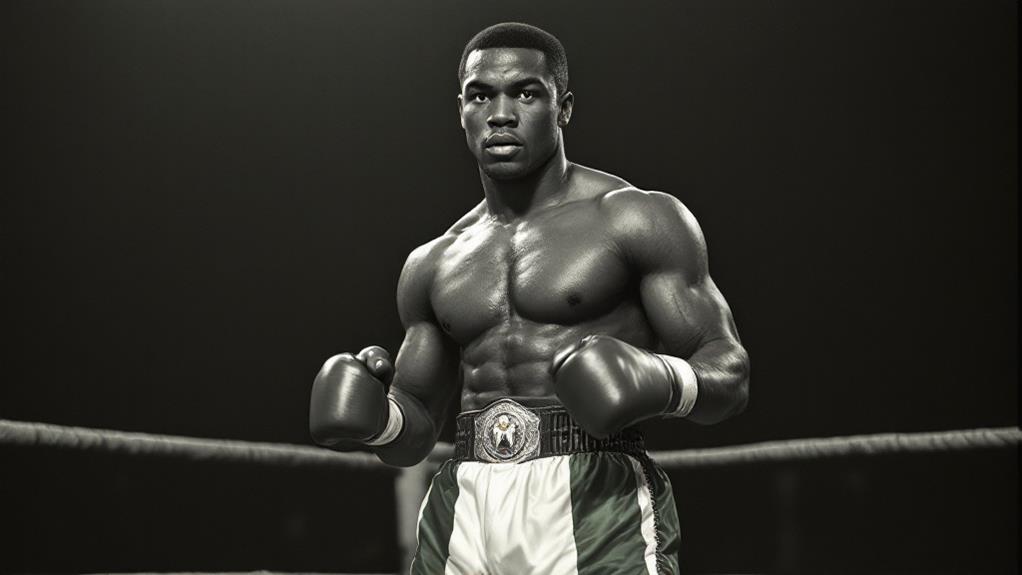Dick Tiger: Nigeria's Boxing Legend Who Ruled the Ring

Dick Tiger, born in Nigeria in 1929, became one of boxing's most respected champions. He rose from local success to international stardom, clinching world titles in both middleweight and light heavyweight divisions. Tiger's expedition took him from Nigeria to England and the United States, where he faced legendary opponents like Gene Fullmer and Joey Giardello. Known for his strength and unwavering style, he defended his titles multiple times and was inducted into the International Boxing Hall of Fame. Beyond the ring, Tiger's life was marked by his involvement in the Nigerian Civil War and later struggles. His story is a representation of perseverance and sporting excellence.
Early Life in Nigeria
Three key events shaped Dick Tiger's early life in Nigeria. Born in 1929 in Amaigbo, he grew up in a world vastly different from the boxing rings he'd later dominate. The first pivotal moment came when British military officers stationed in Nigeria introduced him to boxing. This encounter sparked a passion that would lead him to become one of the greatest middleweight and heavyweight champions in history.
The second defining event occurred in 1952 when Tiger began his professional boxing career in Nigeria. It wasn't long before he proved his mettle, clinching the Nigerian middleweight championship. This victory set the stage for his future success on the world stage.
The third essential moment came in 1955 when Tiger made the bold decision to move to England. This move would ultimately propel him towards international fame and his eventual induction into the International Boxing Hall of Fame. Little did he know that years later, he'd return to Nigeria as a celebrated hero, defending his world title in front of 30,000 fans in Ibadan. Tiger's odyssey from Amaigbo to the world stage is a chronicle of his skill, determination, and the unexpected path that led him to join the Biafran army later in life.
Rise to Boxing Prominence
Dick Tiger's ascent to boxing stardom began with a series of impressive victories in the 1950s. After winning the Nigerian middleweight championship, he moved to England in 1955, where he continued to dominate the ring. His skills and determination led him to capture the British Commonwealth middleweight title in 1958, solidifying his reputation as a force to be reckoned with.
You'll find that Tiger's career reached new heights when he started competing in the United States in 1959. His ceaseless pursuit of greatness paid off in 1962 when he clinched the WBA world middleweight title by defeating Gene Fullmer in a 15-round decision. Tiger's reign as champion was marked by successful defenses, including a draw and a knockout against Fullmer in 1963.
Although he briefly lost the middleweight title to Joey Giardello later that year, Tiger's resilience shone through. He reclaimed the championship in 1965, joining an elite group of fighters who've won back a world title. Not content with his middleweight success, Tiger set his sights on the light heavyweight division. In 1966, he captured the world light heavyweight title, further cementing his legacy as a boxing legend.
Middleweight Championship Glory

Tiger's rise to boxing prominence set the stage for his extraordinary reign as middleweight champion. In 1962, he claimed the NBA middleweight title with a decisive 15-round victory over Gene Fullmer. This triumph marked the beginning of his exceptional adventure as a middleweight champion.
Tiger's achievements in the middleweight division were nothing short of impressive:
- He successfully defended his title twice against Fullmer
- His fights took place in both Nigeria and the United States
- He regained the title in 1965 after losing it to Joey Giardello in 1963
- His reign established him as one of the elite champions in the division
- His middleweight championship victories contributed to his Hall of Fame career
You'll find that Tiger's dominance in the middleweight class was a manifestation of his skill and determination. He faced tough opponents and overcame setbacks, showcasing his resilience as a fighter. His ability to reclaim the middleweight title after losing it demonstrated his unwavering spirit and commitment to excellence. Tiger's middleweight championship glory solidified his status as a boxing legend and paved the way for his induction into the Hall of Fame.
Light Heavyweight Triumphs
A new chapter in boxing history began when the Nigerian powerhouse stepped up to the light heavyweight division in 1966. At 39, DICK TIGER became the oldest champion in boxing when he clinched the world light heavyweight title with a 15-round decision over José Torres. This remarkable achievement solidified his place in the International Boxing Hall of Fame.
Tiger's dominance in the light heavyweight class continued into 1967, as he successfully defended his title twice. The World Boxing Association champion seemed unstoppable, captivating audiences at Madison Square Garden and beyond. However, his reign came to an abrupt end in 1968 when he faced Bob Foster.
In a shocking turn of events, Foster knocked out Tiger in the fourth round, marking the only time in Tiger's illustrious career that he'd been stopped. This defeat not only cost him the light heavyweight crown but also signaled the beginning of the end for the Nigerian icon.
After losing his title, Tiger attempted to reclaim glory in the middleweight division. Despite his efforts, he couldn't regain the world championship before hanging up his gloves in 1971.
Civil War Involvement

Loyalty drove Dick Tiger's involvement in the Nigerian Civil War, where he served as a public relations officer for the Biafran army. Richard Ihetu, as he was born, stood firmly by his beliefs and refused to abandon his country, even as the conflict raged on. His dedication to Biafra's cause was steadfast, despite the personal losses he suffered.
As the war progressed, Dick Tiger faced significant challenges:
- Lost property and money due to the conflict
- Concerned for his family's safety in Biafra
- Determined to donate his fight earnings to the war effort
- Flew to New York via an undisclosed route
- Believed Biafra's story was misrepresented in the media
Despite his successful boxing career in the United States, Tiger's heart remained with his people. He chose to return to Biafra, preferring to die there rather than flee with his family. The civil war's impact on Tiger's life was deep, forcing him to work as a security guard in New York to make ends meet. Yet, his commitment to Biafra never faltered, showcasing the strength of character that made him both a boxing legend and a patriot.
Later Career and Retirement
After a stellar 15-year career spanning 81 professional fights, Dick Tiger returned to Nigeria in 1971. You'd be hard-pressed to find a boxer with a more impressive resume. He'd successfully defended both the middleweight and light heavyweight titles, becoming only the second fighter to hold both championships simultaneously.
Tiger's career wasn't without setbacks. He lost his middleweight title to Joey Giardello in 1963 but regained it two years later with a powerful left hook. His involvement in the Nigerian Civil War as a public relations officer for the Biafran army affected his focus during his final fight against Bob Foster. In that bout, he lost the light heavyweight title by knockout.
After retiring, Tiger's life took unexpected turns. He lost much of his property and money during the war and went to work as a security guard at a museum in New York. It was a far cry from his days as a heavyweight championship contender when he'd lost a 10-round decision to Jersey Jones years ago. Eventually, Tiger returned to Nigeria, where he spent his final days before succumbing to terminal cancer.
Legacy and Boxing Hall of Fame

Dick Tiger's impact on the boxing world extends far beyond his final fight. His induction into the International Boxing Hall of Fame in 1991 solidified his status as one of the greatest middleweights and light heavyweights of his era. You'll find Tiger's legacy marked by:
- Successful title defenses in two weight classes
- Remarkable resilience, losing by knockout only once
- Overcoming adversity during the Nigerian Civil War
- Maintaining his career despite losing property and money
- Securing his place in boxing history against all odds
Tiger's prowess in the ring was evident as he faced formidable opponents like Emile Griffith and Puerto Rican fighters. His ability to adapt to different weight classes showcased his versatility, dominating both as a middleweight and light heavyweight champion. Even in tough battles, like his fourth-round victory over Roger Rouse, Tiger's skill and determination shone through.
What sets Tiger apart is not just his in-ring accomplishments, but his perseverance in the face of personal and national turmoil. Despite the challenges posed by the Nigerian Civil War, he continued to defend his titles and represent his country with honor. Tiger's path from adversity to the Boxing Hall of Fame serves as an inspiration to aspiring boxers worldwide.


